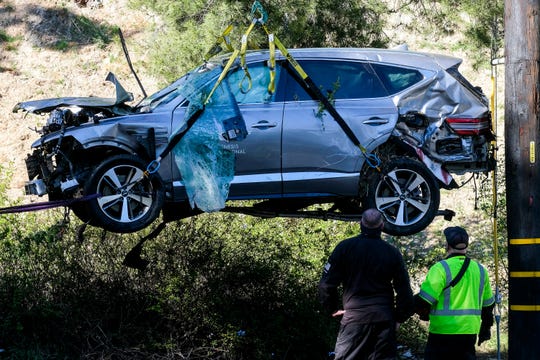Cities responsible for the road where Tiger Woods crashed could be found liable in court, lawyer says
LOS ANGELES — The two cities responsible for the road on which Tiger Woods crashed his car and suffered serious leg injuries Tuesday could be liable for the accident, according to a California attorney who said he has been involved in similar cases.
Neil Shouse, a former deputy district attorney in Los Angeles County, cited the 13 accidents that the Los Angeles County Sheriff’s Department said occurred on the stretch of sloped, windy road in Rancho Palos Verdes and Rolling Hills Estates where Woods crashed.
“That would be data that would put that cities on notice that it’s a dangerous stretch of roadway,’’ Shouse, who now runs his own law firm, told USA TODAY Sports. “And their failure to take reasonable steps to alleviate that danger, to either redesign the roadway or add a traffic signal, reduce the speed limit, add speed bumps, take various measures to reduce the risk, their failure to do that could potentially subject them to liability.’’
STAY INFORMED: Keep up with latest on Tiger's recovery. Sign up for our sports newsletter.
Workers watch as a crane is used to lift a vehicle following a rollover accident involving golfer Tiger Woods, Tuesday, Feb. 23, 2021, in the Rancho Palos Verdes section of Los Angeles. (Photo: Ringo H.W. Chiu, AP)
City officials with Rolling Hills Estates and Rancho Palos Verdes declined comment when contacted by USA TODAY Sports and asked about the history of accidents on that stretch of Hawthorne Boulevard. The cities share jurisdiction of the road, according to Los Angeles County.
The road has a speed limit of 45 miles per hour, but one sheriff's deputy said he's clocked cars going as fast at 80 mph.
The Los Angeles County sheriff has said there is no evidence that Woods was impaired during the crash and called it “purely an accident.”
Shouse said he has been involved in at least 10 lawsuits against public entities for dangerous roadway or dangerous conditions on the roadway and has won about half of the cases.
“It can be difficult to sue the sovereign and sometimes fight city hall,’’ he said. “But if you do successfully, it can be a big case for the client."
Source: Read Full Article

